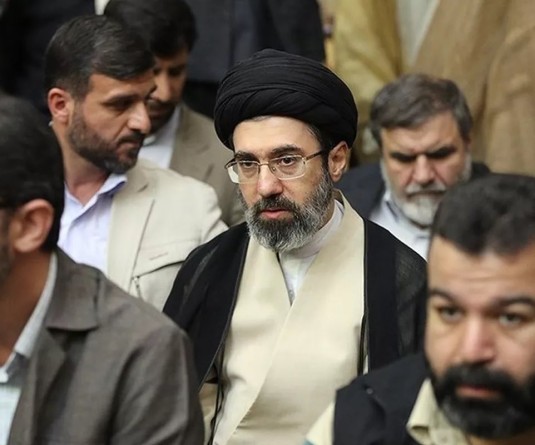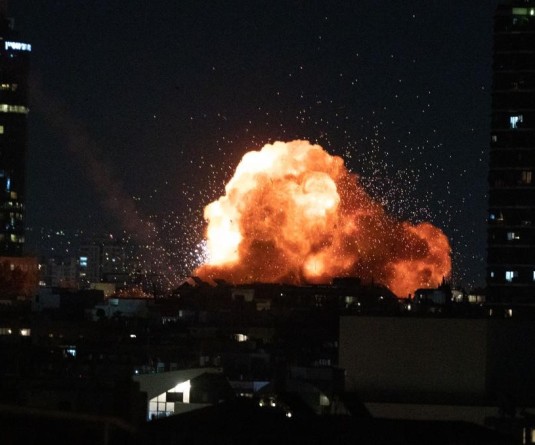
CAIRO, February 11 (AP): Egypt's powerful military backed President Hosni Mubarak's plan to stay in office until September elections, enraging hundreds of thousands of protesters who deluged squares in at least three major cities Friday, marched on presidential palaces and broke through army barricades at the state TV building - key symbols of the authoritarian regime.
The army's show of solidarity with the president was a heavy blow to protesters who called on the military to take action to push Mubarak out after he announced Thursday night that he would hand most of his powers to Vice President Omar Suleiman but remain in office.
The Armed Forces Supreme Council, the military's highest body, depicted itself as the champion of reform in its latest statement. Trying to win the trust of an angry and skeptical population, the army promised to make sure Mubarak lifts hated emergency laws immediately once protests end. Mubarak and Suleiman had only given a vague timetable for ending the law - when security permits. Still, the profound disappointment that Mubarak did not step down on Thursday turned to rage on Friday and protests escalated.
"What are you waiting for?" one protester yelled in the face of an army officer outside Mubarak's main palace, Oruba, in northern Cairo, where a crowd of demonstrators grew to more than 2,500. "Did you pledge your allegiance to the president or the people?" another shouted.
It was not known if Mubarak was in the palace, one of at least three in Cairo, or even in the capital. The palace was protected by four tanks and rolls of barbed wire, but soldiers did nothing to stop more people from joining the rally.
The march on the palace were the first by protesters who for nearly three weeks have centered their mass demonstrations in Cairo's downtown Tahrir Square. More than 10,000 tore apart military barricades in front of the towering State Television and Radio building, a pro-Mubarak bastion that has aired constant commentary supporting him and dismissing the protests. They swarmed on the Nile River corniche at the foot of the building, beating drums and chanting, "Leave! Leave! Leave!" They blocked employees from entering, vowing to silence the broadcast.
Soldiers in tanks in front of the building did nothing to stop them, though state TV continued to air.
"The employees have been perpetuating lies and haven't been broadcasting the real message, feelings, and voice of the Egyptian people," said Mahmoud Ahmed, a 25-year-old graphic designer. "Nobody in Egypt feels like they know what is happening because state television is lying to them."
The protesters shouted, "We are here, where is Al-Jazeera." The pan-Arab news network has aired blanket coverage of the demonstrations, largely positive, and has been targeted by the government.
Other protesters massed outside the Cabinet and parliament buildings, both largely empty, several blocks from Tahrir. Tahrir Square was packed shoulder-to-shoulder with a crowd that rivaled the quarter-million figure of the biggest protests, stunned by Mubarak's blunt determination not to bend in the face of the biggest mass uprising in Egypt's history, now in its 18th day.
The army's show of solidarity with the president was a heavy blow to protesters who called on the military to take action to push Mubarak out after he announced Thursday night that he would hand most of his powers to Vice President Omar Suleiman but remain in office.
The Armed Forces Supreme Council, the military's highest body, depicted itself as the champion of reform in its latest statement. Trying to win the trust of an angry and skeptical population, the army promised to make sure Mubarak lifts hated emergency laws immediately once protests end. Mubarak and Suleiman had only given a vague timetable for ending the law - when security permits. Still, the profound disappointment that Mubarak did not step down on Thursday turned to rage on Friday and protests escalated.
"What are you waiting for?" one protester yelled in the face of an army officer outside Mubarak's main palace, Oruba, in northern Cairo, where a crowd of demonstrators grew to more than 2,500. "Did you pledge your allegiance to the president or the people?" another shouted.
It was not known if Mubarak was in the palace, one of at least three in Cairo, or even in the capital. The palace was protected by four tanks and rolls of barbed wire, but soldiers did nothing to stop more people from joining the rally.
The march on the palace were the first by protesters who for nearly three weeks have centered their mass demonstrations in Cairo's downtown Tahrir Square. More than 10,000 tore apart military barricades in front of the towering State Television and Radio building, a pro-Mubarak bastion that has aired constant commentary supporting him and dismissing the protests. They swarmed on the Nile River corniche at the foot of the building, beating drums and chanting, "Leave! Leave! Leave!" They blocked employees from entering, vowing to silence the broadcast.
Soldiers in tanks in front of the building did nothing to stop them, though state TV continued to air.
"The employees have been perpetuating lies and haven't been broadcasting the real message, feelings, and voice of the Egyptian people," said Mahmoud Ahmed, a 25-year-old graphic designer. "Nobody in Egypt feels like they know what is happening because state television is lying to them."
The protesters shouted, "We are here, where is Al-Jazeera." The pan-Arab news network has aired blanket coverage of the demonstrations, largely positive, and has been targeted by the government.
Other protesters massed outside the Cabinet and parliament buildings, both largely empty, several blocks from Tahrir. Tahrir Square was packed shoulder-to-shoulder with a crowd that rivaled the quarter-million figure of the biggest protests, stunned by Mubarak's blunt determination not to bend in the face of the biggest mass uprising in Egypt's history, now in its 18th day.






